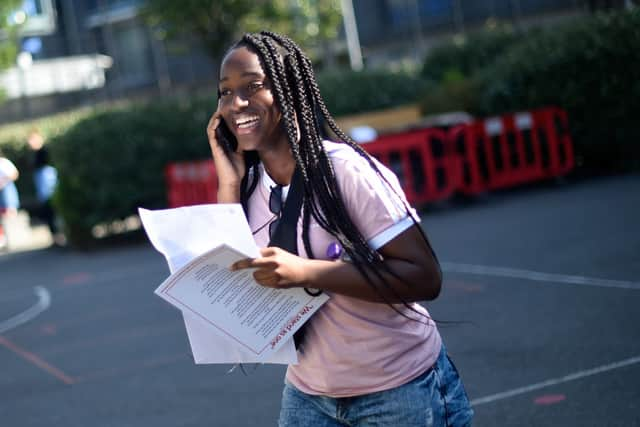Results Day: how to deal with stress and anxiety around GCSEs and A-levels - advice for students and parents
and live on Freeview channel 276
Results Day is nearly here for A-Level and GCSE students, and new research has revealed that four in five young people are suffering from considerably more stress and anxiety.
A survey by Generation Logistics found that 79% of teenagers reported feeling greater levels of stress in the past few months; while only 15% said their mental health had not been affected in the lead-up to finding out their results.
Advertisement
Hide AdAdvertisement
Hide AdExperts have also said that anxiety amongst young people is higher than usual this year due to the government’s insistence on grades returning to ‘normal’, pre-pandemic levels. Students and parents have been told to “brace for disappointment”, with 95,000 fewer A* and A grades set to be awarded to sixth-formers in 2023 compared with in 2022.
Although results are still expected to be higher than in the last year before Covid-19, the anticipated drop in top grades has made this year’s cohort “one of the most anxious ever seen”, according to the Association of School and College Leaders.
But there are things students - and parents - can do to help with these levels of stress and anxiety both before and on Results Day. NationalWorld has heard from both school leaders and psychologists, who have offered their top tips on how to tackle receiving results.


Signs to look out for
If you’re a parent, grandparent, sibling, or friend of someone receiving their results, you may have noticed a change in their behaviour in recent days or weeks. For example, they may be more down or more irritable than usual, or perhaps quieter and less willing to communicate.
Advertisement
Hide AdAdvertisement
Hide AdThere may also be physical symptoms - such as headaches or an upset stomach. Plenty of people struggling with stress and anxiety also often find that they are having trouble sleeping, or have less of an appetite.
Joanna Leite, Deputy Head of Sidcot Independent School in Somerset, said: “The exam season can be a stressful and challenging time for students. As a parent myself of a child awaiting GCSE results, it can be difficult to know how to give your child what they need both before and after exam results are released.
“Finding the right way to offer support can often feel like a balancing act. The key thing to consider is finding ways to help them deal with their feelings in a positive way and avoiding adding to the pressure they’re experiencing.
“Prioritising mental, emotional and physical health, finding effective outlets for stress and creating a plan of action for any potential outcome can go a long way to helping students feel supported and prepared, no matter what their results are.”
Advertisement
Hide AdAdvertisement
Hide AdHow to support young people receiving their results
Ms Leite has offered some advice on how to best support students before and on Results Day. In the lead up, she suggests:
Providing emotional support
“There’s a lot of emphasis placed on exam results, so it’s important to reassure your child that their worth is not determined by how they do - and that, while they may feel overwhelmed or disappointed now, those feelings will not last forever,” Ms Leite said.
She added that it’s important to “create a space where your child feels comfortable discussing their feelings”. You can encourage them to talk about their worries or concerns - so you’re best placed to offer support.
Avoiding adding pressure
“It’s natural to want the best for your child,” Ms Leite said, but talking about the grades you expect or the ones their teachers predicted can add more pressure during an already anxious time. “Try to be a supporter instead of a coach or manager,” she explained.
Advertisement
Hide AdAdvertisement
Hide AdTo combat pressure, it can also be worthwhile trying to help students set realistic expectations and not expect too much of themselves. This means if they succeed, they can feel even more excited, and if they don’t perform as well, they can be better prepared to overcome disappointment.
Keep things as normal as possible
“Waiting for results can often feel like everyone is on tenterhooks, which can be an anxious experience for everyone involved,” Ms Leite said. It’s good to try to avoid talking about the day too much - and keep things as normal as possible.
Making a big deal about results can come after students have received their results, when you can all celebrate!
How can I manage my own stress and anxiety?
If you’re a student waiting for results yourself, there are also things you can do in the lead-up and on the day. Fiona Yassin, a psychotherapist and clinical director of The Wave Clinic - which specialises in supporting young people - suggested:
Practise relaxation techniques
Advertisement
Hide AdAdvertisement
Hide Ad“Certain physical and mental exercises can help relieve stress in a given moment, immediately calming the mind and body down,” Ms Yassin said. Therefore, practising relaxation exercises - such as yoga, meditation, and deep breathing - on the night before or morning of your results, can significantly reduce anxiety and help keep you calm.
Stay in the present moment
If you don’t get the results you were hoping for, it’s important to “avoid diving straight into the future”, Ms Yassin advised. If you’re disappointed, you may start imagining a future you’re disappointed with too - but this isn’t the reality.
Stay in the moment, remember results aren’t everything, and keep in mind all of the options you still have.
Plan for the day
On that note, it can help some students feel less stressed if they feel prepared for the day. So, without going all doom and gloom, it may be worth checking what your options are if things don’t go as planned - such as reading advice on clearing, re-sits, or plans that don’t include university.
Avoid comparing results
Advertisement
Hide AdAdvertisement
Hide Ad“No matter how bad or how well you have done, it’s not helpful to compare results,” Ms Yassin argued. “It can encourage jealousy or competitiveness, and may leave [you or others] feeling hurt if [you or they] have not achieved certain grades.”


How can I act as a parent?
Some of the tips for students stay the same for parents. Avoiding comparisons is an important one - as you want to focus on your child, their efforts, and their experience.
You also want to strike a balance between planning for the day - looking at options, and how to react - and avoiding planning too much for the future if things don’t go as planned. “Sometimes, young people hear parents planning out loud and translate it as a lack of trust or faith in their ability to succeed,” Ms Yassin explained.
Other advice for parents, according to Ms Leite and Ms Yassin, includes:
Don’t take your child’s results personally
Advertisement
Hide AdAdvertisement
Hide Ad“It’s really important to acknowledge that, no matter how much support you’ve given your child in the run up to their exams, these are not your exams. These results belong to your young person and it’s important you stay in your lane at this point,” Ms Yassin said. “You can be there, but try not to take it on as something that’s your own.”
Allow your child to feel their emotions and be empathetic
Students can feel a range of emotions on Results Day, and it’s important they are allowed to feel what they’re feeling. You should listen to their emotions, validate them, and try to be there in the moment - instead of trying to “fix things”, the experts suggested.
Respect their space
As part of allowing students to feel their emotions, Ms Leite says young people may also need their space. Some people deal with things by talking them through or reaching out for support, but others need a moment or two to process things - and it’s helpful to respect that.
Celebrate their efforts
No matter what results your child, grandchild, sibling, or friend achieves, it’s important to recognise the efforts they put into their exams. Ms Leite added: “Reassure your child about the hard work they put in, and celebrate their perseverance and dedication.”
Comment Guidelines
National World encourages reader discussion on our stories. User feedback, insights and back-and-forth exchanges add a rich layer of context to reporting. Please review our Community Guidelines before commenting.
